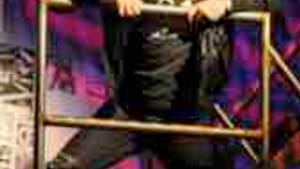Stay in the Loop
BSR publishes on a weekly schedule, with an email newsletter every Wednesday and Thursday morning. There’s no paywall, and subscribing is always free.
Adolescence after 9/11 (but before Bernie Madoff)
"American Idiot' on Broadway

Sometime in the not-too-distant past, a successful Broadway musical was characterized by two ingredients: original music and a compelling story. Costumes, set and choreography were important, but they took a backseat to the production's core concerns. New examples of this old model still find audiences and thrive (this year's Pulitzer-winner, Next to Normal, is one such show). But it's the jukebox musical— a compendium of well-worn pop songs with a tacked-on plot— that endures for years, embarks on multiple national tours and turns its producers into millionaires. Jersey Boys (featuring the songs of Frankie Valli and the Four Seasons), Mamma Mia and Rock of Ages (the 1980s hair metal oeuvre) are only the latest and best-known examples of this genre.
So, does American Idiot, the new musical based on Green Day's 2004 concept album/rock opera, belong in this category? Or can it transcend it?
That album benefited from fortuitous timing, appearing as it did between the fall of the Twin Towers and Bernie Madoff. In the process the album turned a trio of Southern California goof-offs— previously known for penning punk ditties about being too bored to masturbate— into populist heroes. The band concentrated their collective frustration into 13 songs about love, anger and alienation, broken homes and a collapsing economy, all in the shadow of the war in Iraq.
The album sold 14 million copies, landed atop Rolling Stone's list of the decade's most important, and anointed its frontman and principal songwriter, Billy Joe Armstrong, as the anti-heroic voice of a new generation. Jukebox musicals don't usually take aim at the establishment; they aspire to join it.
Gorgeous new arrangements
American Idiot (the musical) is no collection of tangentially related tunes hot-glued and staple-gunned together, but neither is it Tommy, the messy, bloated rock opera based on The Who's 1969 album. It's the record, mostly in order, with a little extra padding, as well as gorgeous arrangements by Tom Kitt that allow the album's fans to appreciate the songs anew.
Director Michael Mayer and Armstrong were wise not to tinker much with music that holds such resonance for so many, sticking to a bare-bones book— though its flashy lighting, five-story-walled set plastered with newspapers and studded with TVs, and thrashing knees-and-elbows choreography bring the production closer in tone to a rock concert than theater.
Mayer's presence as director gives American Idiot serious stage credibility. After directing Thoroughly Modern Millie in 2002, Mayer helmed the groundbreaking Spring Awakening, which reimagined Frank Wedekind's dark 19th-Century German expressionist drama as a hormone-fueled rock fantasy. By using original music by the pop singer/songwriter Duncan Sheik, Spring Awakening brought Broadway the same sort of adolescent fervor that burns through American Idiot. It also made rock stars of its cast and filled the house with young fans so excited by a night at the theater that they returned multiple times, often singing along with the cast.
Mayer, clearly hoping to recapture some of that stage magic, hired John Gallagher, Jr., who played Spring Awakening's tormented, suicidal Moritz, as Johnny, American Idiot's leading role.
Cardboard cutout characters
Still, unless you've logged significant hours listening to the album, the show's staging is pretty ridiculous. American Idiot contains about five lines of what might be considered dialogue. Its characters, such as they are— St. Jimmy (Tony Vincent), a drug-dealing rock and roll suicide; Whatsername (Rebecca Naomi Jones), the girl who got away; Johnny (John Gallagher, Jr.), who stops sucking bonghits on a buddy's couch long enough to go on a big-city adventure— appear as shrink-wrapped cardboard cutouts propped up against Armstrong's raging power-pop anthems.
The show replicates the experience of slapping on a pair of headphones, closing your eyes and imagining your own version of what's going on. That's why jukebox musicals are so successful.
But if Broadway has indeed become Disneyworld, is American Idiot merely the newest punk rock ride? Yes and no. Jukebox musicals generally run on kitsch and nostalgia; American Idiot is fueled by self-conscious earnestness and passion.
Yet for all the production's efforts at authenticity, its ersatz underpinnings still show. But maybe that's the point. Coming of age doesn't necessarily mean growing up, and American Idiot's fakery is in keeping with its themes of adolescence, both real and perennial. American Idiot will strike many theatergoers as just one more product-pusher fouling a doorway along the Great White Way. But others will recognize it as a true American period piece, a capsule containing all the energy of the moment after everything changed and just before it all changed again.
So, does American Idiot, the new musical based on Green Day's 2004 concept album/rock opera, belong in this category? Or can it transcend it?
That album benefited from fortuitous timing, appearing as it did between the fall of the Twin Towers and Bernie Madoff. In the process the album turned a trio of Southern California goof-offs— previously known for penning punk ditties about being too bored to masturbate— into populist heroes. The band concentrated their collective frustration into 13 songs about love, anger and alienation, broken homes and a collapsing economy, all in the shadow of the war in Iraq.
The album sold 14 million copies, landed atop Rolling Stone's list of the decade's most important, and anointed its frontman and principal songwriter, Billy Joe Armstrong, as the anti-heroic voice of a new generation. Jukebox musicals don't usually take aim at the establishment; they aspire to join it.
Gorgeous new arrangements
American Idiot (the musical) is no collection of tangentially related tunes hot-glued and staple-gunned together, but neither is it Tommy, the messy, bloated rock opera based on The Who's 1969 album. It's the record, mostly in order, with a little extra padding, as well as gorgeous arrangements by Tom Kitt that allow the album's fans to appreciate the songs anew.
Director Michael Mayer and Armstrong were wise not to tinker much with music that holds such resonance for so many, sticking to a bare-bones book— though its flashy lighting, five-story-walled set plastered with newspapers and studded with TVs, and thrashing knees-and-elbows choreography bring the production closer in tone to a rock concert than theater.
Mayer's presence as director gives American Idiot serious stage credibility. After directing Thoroughly Modern Millie in 2002, Mayer helmed the groundbreaking Spring Awakening, which reimagined Frank Wedekind's dark 19th-Century German expressionist drama as a hormone-fueled rock fantasy. By using original music by the pop singer/songwriter Duncan Sheik, Spring Awakening brought Broadway the same sort of adolescent fervor that burns through American Idiot. It also made rock stars of its cast and filled the house with young fans so excited by a night at the theater that they returned multiple times, often singing along with the cast.
Mayer, clearly hoping to recapture some of that stage magic, hired John Gallagher, Jr., who played Spring Awakening's tormented, suicidal Moritz, as Johnny, American Idiot's leading role.
Cardboard cutout characters
Still, unless you've logged significant hours listening to the album, the show's staging is pretty ridiculous. American Idiot contains about five lines of what might be considered dialogue. Its characters, such as they are— St. Jimmy (Tony Vincent), a drug-dealing rock and roll suicide; Whatsername (Rebecca Naomi Jones), the girl who got away; Johnny (John Gallagher, Jr.), who stops sucking bonghits on a buddy's couch long enough to go on a big-city adventure— appear as shrink-wrapped cardboard cutouts propped up against Armstrong's raging power-pop anthems.
The show replicates the experience of slapping on a pair of headphones, closing your eyes and imagining your own version of what's going on. That's why jukebox musicals are so successful.
But if Broadway has indeed become Disneyworld, is American Idiot merely the newest punk rock ride? Yes and no. Jukebox musicals generally run on kitsch and nostalgia; American Idiot is fueled by self-conscious earnestness and passion.
Yet for all the production's efforts at authenticity, its ersatz underpinnings still show. But maybe that's the point. Coming of age doesn't necessarily mean growing up, and American Idiot's fakery is in keeping with its themes of adolescence, both real and perennial. American Idiot will strike many theatergoers as just one more product-pusher fouling a doorway along the Great White Way. But others will recognize it as a true American period piece, a capsule containing all the energy of the moment after everything changed and just before it all changed again.
Sign up for our newsletter
All of the week's new articles, all in one place. Sign up for the free weekly BSR newsletters, and don't miss a conversation.
 Wendy Rosenfield
Wendy Rosenfield